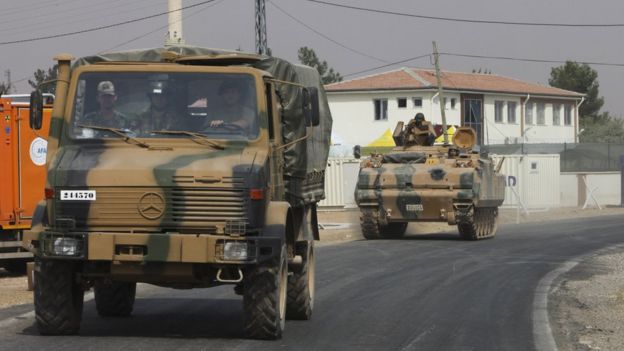
More than 80 ISIS targets were attacked in the first hours of “Operation Euphrates Shield” early Wednesday, officials say, as Turkish armor and warplanes targeted a key ISIS-held town across its border with Syria.
Why is Turkey doing this now?
Turkish authorities have been pressed into taking action against ISIS by the surge of suicide bombings in Turkey, as well as the terror group’s use of safe houses and “informal” financial services on Turkish soil.
“Daesh should be completely cleansed from our borders, and we are ready to do that,” Turkish Foreign Minister Mevlut Cavusoglu said Tuesday, using an Arabic acronym for ISIS.
In recent days mortar shells apparently fired from ISIS positions in the Jarablus area landed in the Turkish town of Karkamis. More importantly, Turkish authorities blamed ISIS for a devastating suicide bombing at a wedding in the border town of Gaziantep at the weekend, killing 54 people.
It was the latest in a number of suspected ISIS bombings on Turkish soil, including a suicide attack on Istanbul’s international airport in June.
Ankara may also have calculated that ISIS is especially vulnerable, after many of its remaining fighters fled Manbij, another key stronghold in Syria. The town was liberated by the Syrian Democratic Forces (SDF), an alliance of Kurdish and Arab forces backed by the United States.
ISIS’ lines of communication and resupply have now been disrupted and it’s taken heavy losses across northern Syria in recent months.
But Turkey is anxious that ISIS’ vulnerability could provide an opportunity for their “other” enemy in northern Syria — the Kurdish YPG militia — who have taken several villages near Jarablus recently.
There may also be an internal reason for this offensive now. The morale of the military was shaken by July’s coup attempt; a successful offensive against ISIS would play well both for Turkish President Recep Tayyip Erdogan and the high command.
What does Turkey want to achieve
Turkey has several aims. One is to degrade ISIS in this area — to push the threat it poses away from the Turkish border and make infiltration harder. Beyond that, Turkey wants this part of Syria to become part of its sphere of influence. If it can clear this area of ISIS, it plans to inject Syrian rebel groups that it supports, according to officials. Several hundred are currently massed on the border, according to the Syrian Observatory on Human Rights.
Understanding Turkey’s catalog of enemies
The advantage for Turkey in putting its “own” groups into this part of Syria is to stop the Kurdish advance in its tracks.
Ankara sees the YPG as a terrorist group indistinguishable from the PKK, which it battles on a daily basis in south-eastern Turkey. The Syrian Kurds have made no secret of their desire to expel ISIS and link the two regions of northern Syria they already control. They would then oversee much of Syria’s border with Turkey.
Hence the words of Erdogan Wednesday: “Turkey is determined that Syria retains its territorial integrity and will take matters into its own hands if required to protect that unity.”
Tim Lister, CNN
